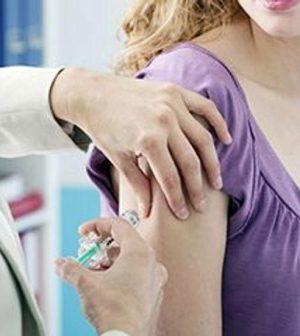- Recognizing the Signs of Hypothyroidism
- 10 Strategies to Overcome Insomnia
- Could Artificial Sweeteners Be Aging the Brain Faster?
- Techniques for Soothing Your Nervous System
- Does the Water in Your House Smell Funny? Here’s Why
- Can a Daily Dose of Apple Cider Vinegar Actually Aid Weight Loss?
- 6 Health Beverages That Can Actually Spike Your Blood Sugar
- Treatment Options for Social Anxiety Disorder
- Understanding the Connection Between Anxiety and Depression
- How Daily Prunes Can Influence Cholesterol and Inflammation
Few Symptoms After Your COVID Shot? Don’t Worry, You Still Got Immune Boost

Just because you didn’t have a significant reaction after your COVID-19 shot doesn’t mean it’s not working, researchers say.
“It wasn’t known if a lack of symptoms following vaccination or prior SARS-CoV-2 infection would indicate a less-than-adequate antibody response in people who received either the Pfizer/BioNTech or Moderna vaccines, so we studied an available group of staff from our hospital to see if there were any connections,” senior author Dr. Aaron Milstone said in a Johns Hopkins news release. He’s an associate hospital epidemiologist at Johns Hopkins Hospital in Baltimore.
The study included more than 950 health care workers who had received both doses of either the Pfizer/BioNTech or Moderna vaccines. Some also had a confirmed prior SARS-CoV-2 infection.
Participants self-reported symptoms after vaccination as none; mild (injection site pain, mild fatigue or headache), or clinically significant (fatigue, fever or chills).
Five percent reported clinically significant symptoms after their first shot, as did 43% after the second dose.
After adjusting for age, sex and prior COVID infection, researchers found that people who got the Moderna vaccine were more likely to have significant symptoms after either dose.
Prior COVID infection was linked with an increased chance of clinically significant symptoms after one dose but not two.
Regardless of symptoms, 99.9% of participants developed antibodies against the coronavirus 14 or more days after their second vaccine dose, according to findings recently published in the journal JAMA Internal Medicine.
The only participant who didn’t develop antibodies was taking an immunosuppressant medication.
Factors associated with higher antibody levels were clinically significant symptoms; being younger than 60; being female; getting the Moderna vaccine; and prior SARS-CoV-2 exposure.
“The findings suggest that either spike mRNA vaccine will work well against SARS-CoV-2, even if a person doesn’t experience symptoms after vaccination or if they had a prior infection by the virus,” said lead author Amanda Debes, assistant scientist in international health at Hopkins’ Bloomberg School of Public Health. “This should help reduce anxieties that the vaccines will be less effective in either situation.”
More information
The U.S. Centers for Disease Control and Prevention has more on COVID-19 vaccines.
SOURCE: Johns Hopkins Medicine, news release, Aug. 25, 2021
Source: HealthDay
Copyright © 2026 HealthDay. All rights reserved.










